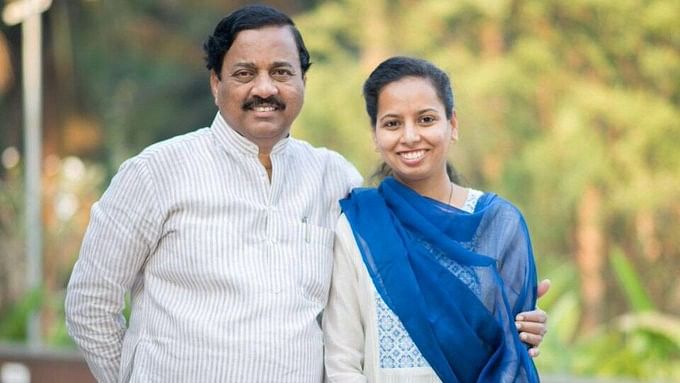
Maharashtra Women and Child Welfare Minister Aditi Tatkare (right).
Credit: X/@iAditiTatkare
Mumbai: The Maharashtra government on Friday unveiled the state's Women's Policy on the occasion of International Women's Day.
The policy, the fourth after the ones announced in 1994, 2001 and 2014, aims for comprehensive and all-inclusive development of women with focus on eight areas.
These are health, nutrition and wellbeing, education and skill development, ending sexual and gender-based violence, gender responsive livelihood enhancement, gender inclusive infrastructure, gender responsive governance and political participation, gender sensitive natural resource management, climate change adaptation and disaster management, as well as an exclusive sports policy.
Announcing the policy, state Women and Child Welfare Minister Aditi Tatkare said free health check-up camps in underserviced, remote and hard-to-reach areas across urban, rural and tribal areas will be undertaken.
Improved diagnostic services at all government health facilities up to Primary Health Centre (PHC) level will be provided for polycystic ovary syndrome (PCOS), endocrine, cancer, urinary tract infections (UTIs), TB, menopausal issues with improved referral systems, she said.
Initiation of demand-based day care centres in establishments with a high number of women and provision of day care facilities in special industrial areas, commerce zones will be the aim of the policy.
"There will be 100 per cent enrolment and retention of adolescent girls in schools at secondary and senior secondary levels in remote and under-served pockets across rural, urban and tribal areas. The state will be categorised into industrial zones to tailor skill development programs to the unique needs and strengths of each region. Such categorization will take into account consider factors like literacy levels and the migration patterns of women," Tatkare said.
To end sexual and gender-based violence, an internal committee as stipulated in the Sexual Harassment of Women at Workplace (Prevention, Prohibition and Redressal) Act will have to be formed, as per the policy, while 'Bharosa Cell' will set up at all police headquarters.
"Women play a significant role in agriculture, especially in rural areas, but they often face challenges due to the lack of access to appropriate and easy-to-use machinery. Industries will be encouraged to create women-friendly agricultural machinery as it is a crucial step towards gender inclusive agriculture development," the minister said.
Self Help Groups (SHGs) will be considered for providing dedicated space for establishing stalls in municipal council and corporation area, while hostels will be established for women engaged in informal work, including seasonal workers such as sugarcane cutters and others, as per the policy.
"Working women's hostels will be provisioned at the district level and in all cities, offering high quality services, safety, and security. Developing a comprehensive training module for elected women representatives covering leadership, planning, budgeting, programme management, implementation, and monitoring and evaluation will also be taken up," she said quoting the policy.
As per the policy, capacities of women will be enhanced to promote their participation and leadership primarily to mitigate and adapt to climate change, effective disaster response and risk reduction, while women living in coastal areas will be oriented to Coastal Regulation Zone (CRZ) and allied environmental regulations.
An exclusive sports policy for women and sportspersons will cover infrastructure, training, financial assistance and allied support, she said.
"The difference between the fourth policy and others is that an implementation plan has been prepared. Benchmarks have been set to measure progress of policy implementation. Responsibilities of various departments have been defined. To review the implementation of this policy, three-level committees have been formed," Tatkare said.
These comprise a high-power committee chaired by the chief minister, the state task force under the women and child development minister and a district-level committee led by the respective guardian minister, she informed.